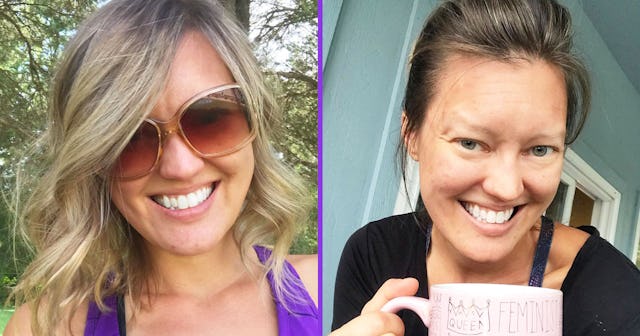I Constantly Have To (Literally) Call Out My Anxiety--Otherwise, It Wins

Anxiety is relentless, and I was growing tired of it running the show. It seemed like every day, anxiety would creep into a new area of my life—tempting me to believe something bad was always lurking around the corner.
I wasn’t ignoring my anxiety. I exercise every morning—because, all those feel-good hormones are released. I made sleep a top priority—because when I wasn’t well rested, my anxiety was worse. I upped my water intake, took an anti-anxiety supplement, and tried meditation. But these things weren’t enough.
They weren’t enough because I had begun to have anxiety attacks over driving. I could be perfectly fine until I slid into the driver’s seat of the minivan, and then panic would ensue. There was no real danger present—but my throat would constrict, my heart would pound, and my breathing became shallower. I sensed the familiar pit in my stomach.
Of course, the worst part was the thoughts. They wouldn’t stop. And no, those of us with anxiety can’t just “take a chill pill” or stop being a Nervous Nelly on command. That’s not how anxiety works. Thinking positively and “going with the flow” aren’t the anxious person’s cup of tea.
Turns out, I’m not alone. One in five adults will face an anxiety disorder diagnosis in their lifetime. But here’s the kicker. Women are twice as likely as men to have anxiety.
This statistic hardly shocks me. It seems like women carry the emotional load for their family’s well-being. I often tell my husband, “I’m not just in charge of me. I’m responsible for myself and our four children.” Their needs are constant. My husband is an equal participant in our home, but I tend to “bulldoze” and take on more responsibility than I probably should. Deep down, I feel that I must always keep our family shit together.
Granted, it wasn’t parenting that brought about my anxiety. I’ve had it my entire life, but was finally diagnosed in my thirties. I’m also parenting a child with anxiety. So yeah, that’s a lot of anxiety in one household. And anxiety? It breeds more anxiety. Yes, it is a vicious cycle.
I knew I had to do something different—something more. My anxiety wasn’t just creeping up occasionally anymore. It was infesting every single area of my life. I was worried about my kids getting in a freak accident, I was obsessing over my physical health and every single ache and pain, and I couldn’t seem to shake off my driving fears.
Thankfully, there are options. And I decided that the first one I needed was to start taking anxiety medication again. I’d held back for far too long. After all, I’d known for months that going back on meds was necessary, but I had to get over my pride and—you guessed it—my anxiety about taking medication.
The second step is something quite simple but profound.
I was in session with my therapist, telling her about how my anxiety was at an all-time high. And I was so sick of it. But I also wanted to desperately pretend it wasn’t there. Avoidance is a classic symptom of anxiety, after all. It’s a method of self-protection to avoid situations and circumstances in which we feel could be dangerous.
The therapist asked me, “Have you thought about addressing the anxiety?” I was puzzled by her question and said I had–with meds, meditation, healthy eating, sleep. She clarified, “I mean, have you thought about just calling it out?”
What does it mean to call out your anxiety? My therapist explained that I could literally stop what I was doing when I’m having anxious thoughts and speak to the anxiety. Yes—audibly. Tell the anxiety that I see it, I hear it, I feel it, and most importantly, that I’m not having it.
My therapist explained that I could literally stop what I was doing when I’m having anxious thoughts and speak to the anxiety. Yes—audibly.
Judging by the look on my face, she admitted that it sounds silly to talk to anxiety. After all, anxiety is not a person. But calling out anxiety—aloud—can be a powerful tool that’s readily available at any moment.
This manifests in real life in two ways. First, I can call out my anxiety throughout my day. Luckily, I work from home and don’t have co-workers giving me weird side-eyes when I’m seemingly talking to myself. Second, I have taken this a step further by telling my family my anxiety is bad on certain days. There is something so invigorating and liberating about clapping back to my anxiety.
Words can carry a lot of weight. And anxiety tells us that we should hide, avoid, and evade. But what if instead, we just called it out?
Calling out anxiety—aloud—can be a powerful tool that’s readily available at any moment.
There’s power in owning my anxiety and sharing it with others. When I started openly talking to my friends and family about anxiety, I discovered how many people also battle it. They had just never felt comfortable enough to share it with someone else—instead resorting to a hidden world of isolation and embarrassment. The stigma of mental illness harms us all.
Anxiety is a liar and a jerk, sort of like your high school boyfriend. But when we stand up to it — by confronting it audibly — we become the empowered ones.
This article was originally published on